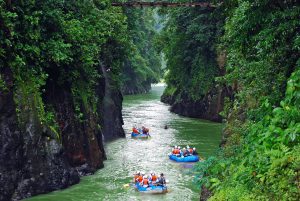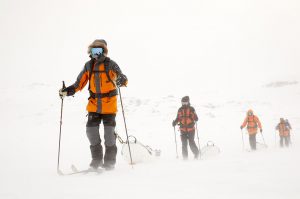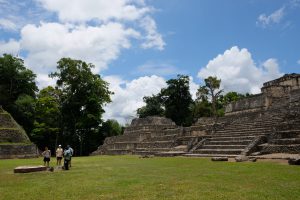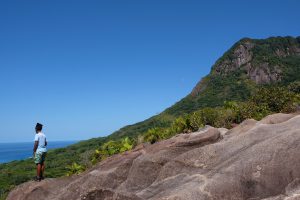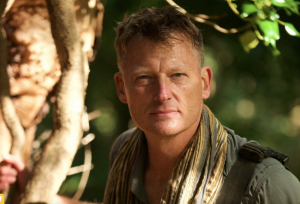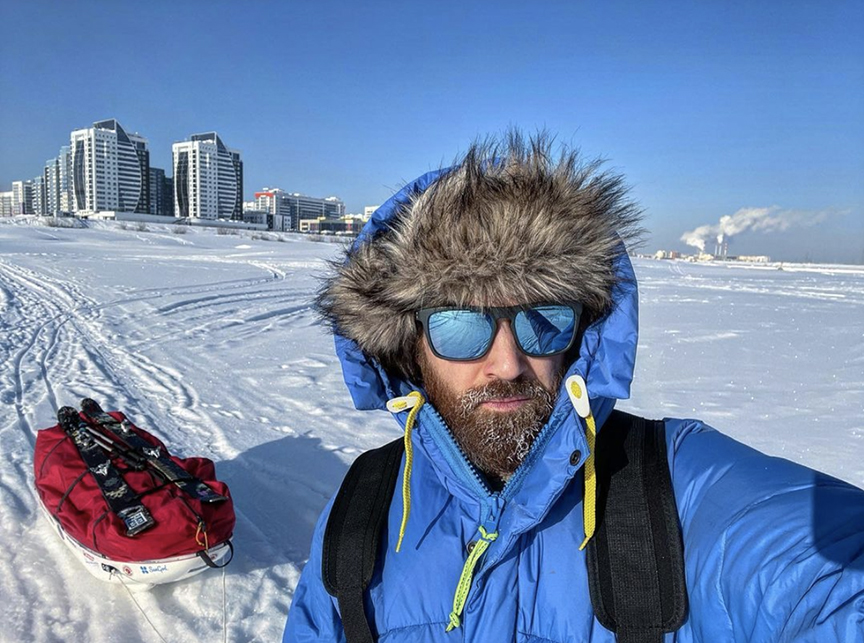
Charlie Walker’s expedition to Russian Siberia to document the impact of climate change on indigenous Evenki reindeer herders was impacted by the country’s invasion of Ukraine in late February 2022. Credit: Charlie Walker
The British explorer was just three days into his latest expedition in Russia when the country invaded Ukraine, exposing him to the whims of the police. Newly returned to the UK after four weeks’ detention, he reflects on his passion for uncharted places
Read the feature online at nationalgeographic.com
What kick-started your career as an adventurer?
Like many people who do what I do, I never expected it to become a living — it happened organically. I wasn’t a particularly outward-bound child but when I left school, I headed down to East Africa with a backpack and became interested in going to lesser-visited places; I wanted to see what was there and what life was like in these places people didn’t talk about. Then, throughout university, I’d scrape together whatever I could to do some sort of trip during the summer, booking the most affordable flight to a city I’d never heard of. I fell in love with the places in between, the empty places.
After university, I flew into Beijing and, almost on a whim, I took a bicycle and for two weeks I cycled across the Gobi Desert to Ulaan Baatar. It was hot and I’d recently broken my wrist and snapped a muscle in my leg; everything that could go wrong did — but during those two weeks something clicked: I saw how great travelling under your own steam was. You get to be in the middle of nowhere, completely self-sufficient, with access to people living very isolated lives, and even if the day was sandblasted and demoralising, then the night would be serene and calm and lovely. It laid the foundations for a decision to spend the next four years cycling across Asia and Africa.
What’s the role of explorers in the 21st century?
I’m an observer of culture. I think the role today is to capture and subsequently communicate a snapshot in time of a place or a people, a phenomenon or a cultural event. I don’t think hardship and pushing the limits of human endurance are necessary to adventure or explore. But I have found that a level of personal challenge provides more access to the people you encounter, partially due to bemusement (‘Why has this person come here by foot or on skis?’) but also if you turn up in a four-wheel-drive vehicle or helicopter you’re immediately putting up an ostentatious, first-world barrier that I don’t think is conducive to making connections.
Do you have any heroes?
From about the time I left school, I read the books of Benedict Allen, who more recently has become a bit of a friend. It’s a strange thing sitting down for a pint and thinking ‘but you’re my hero!’ He’s done a catalogue of extraordinary things, and what I particularly enjoy about Benedict’s work is that he casts out into the middle of nowhere, be that a jungle in Papua New Guinea or the Orinoco Basin, and embeds himself in that culture. He learns to live in that landscape, then uses those skills to undertake some sort of journey.
What has been your greatest challenge?
I’ve spent many months and years predominantly in my own company out in the wild, and it’s probably been my biggest struggle over the years — not weather or whitewater: loneliness. At the beginning, that was crippling — I’d spend days in my own head, longing for a conversation in English, or berating myself for setting a task that involves such grinding solitude. The older I get, and the more time I spend back home in London, where I now live, I realise how insightful time alone can be, especially when we’re surrounded by computers and phones. It’s just a case of trying to step back and appreciate, even if difficult, how rare the adventure you’re on is.
What inspired your latest expedition to Russia?
About five years ago, I was in the Ural Mountains in Siberian Russia — part of an eight-month trip cycling, kayaking and skiing the geographical divide between Europe and Asia. Yakutia, in Siberia, is an area the same size as India — it’s the biggest region in the biggest country on Earth, but only one million people live there and no one’s really aware of them. I realised there was a clock ticking on the mode of existence of the reindeer-herding Indigenous people of the northwest — the reindeer are vulnerable to die in their tens of thousands, as warm autumns and cold winters mean a layer of ice forms over the lichen they’d usually eat — and people are gravitating towards towns to survive. Where they live is also the permafrost region, and catastrophic amounts of methane and carbon will be released as it melts — more and more each year. So their plight is a bellwether for all of us.
The plan was to fly into a town called Yakutsk in February and then ski-trek along the Lena River, which is Russia’s third-longest river, and the 10th longest in the world. From there I’d head north for 1,000 miles to Tiksi on the Arctic coast. But that’s not quite how it turned out, for a few reasons.
How did you adapt the journey?
The invasion happened three days after I arrived, so I had to have a think about what to do. My reasoning for staying on partially was that I was just so distant from it. Geographically, in Yakutsk, I was about the same distance from Vancouver as I was from Kiev. I was on the same time zone as Adelaide, east of even Pyongyang in North Korea. So, the next day, I got on the river and started pulling my sled north — but at the end of three days I hadn’t got very far. There was thigh-deep powder covering the entire Lena River. It would be a fool’s errand to try and continue.
I had to reassess and took a short flight to an unspeakably bleak, small town called Batagay, where all the streets are covered in coal-stained snow and big posters that advise people not to drink themselves into an early grave. It’s about 100 miles north of the Arctic Circle and sits on the Yana River. From here, it would be a slightly shorter route — 600 miles instead of just over a 1,000 — initially following zimniki (ice roads) cleared by snow ploughs for trucks to transport goods. And, broadly speaking, it went well. The weather was as brutally cold as I anticipated. For the first month it didn’t get above -25C, day or night. But roughly once a week, I’d encounter a small village and be taken under the wing of friendly, middle-aged women.
What were your encounters with Russian people like?
There was a reticence I hadn’t experienced before. Russia is a taciturn place at the best of times; people don’t necessarily take warmly to strangers. But with a new ideological divide rent through Europe, suddenly everyone was aware I was on the other side. Some people quietly expressed their doubts about what they’re reading in Russian state media, some people outright told me that they were ashamed to be Russian with what was going on. One of them was even a man in uniform. But in groups, no one would dare say such a thing, because all that can happen is they endanger themselves or their families.
Inevitably, the war became the focus of many conversations I had with people. And as a result, the expedition developed into exploring a bit more about what ordinary people thought. Many, many people were for the war and believed everything they’ve been told about ‘Nazis’ in Ukraine.
When did you catch the eye of the Russian authorities?
Three and a half weeks in, I approached a town called Ust’-Kuiga. A jeep was waiting for me, and in it were two policemen. They asked me questions, took some selfies and off they went. But the next day, they came to the place I was staying and said we need to fine you for conducting journalism while on a tourist visa — which was ridiculous. But it seemed the only way to leave would be to sign these Russian documents. It didn’t worry me too much at the time. But now I was essentially a confessed journalist. And from that point onwards, I was tracked wherever I went.
When I finally reached Tiksi, I heard the FSB (formerly the KGB) wanted to talk to me. After hours of questioning, I was taken to court, which was hastily convened at 9:30pm (the judge was furious at being called in that late), and found guilty of conducting journalism and also of photographing sensitive military sites. I was told you’ve got a five-year ban from visiting Russia and you’ve got to leave the country.
Weeks passed without being deported; I got a lawyer, and my appeal was rejected out of hand. The longer I was there, the more it felt possible they would try me on a criminal charge with a new law that had a sentence of up to 15 years for spreading ‘fake news about the military’ — so journalists who disagree with the official narrative.
The detention centre was very much a prison. For the first few weeks, I was with a couple of cell mates. Then, by myself. Cameras in the ceiling, lights on throughout the night, meals handed through a hatch, abrasive guards. I wasn’t abused or mistreated, but it was constantly anxiety inducing not knowing what they would do with me. Eventually, after four weeks, they said: “Right, you’re going home.”
What have you taken away from the experience?
I still think of Yakutia as a big, beautiful, barren Siberian wilderness. I’m desperate to avoid holding any bitterness towards normal people — even the guards, who were just doing their jobs. I still view this war as one leader’s mad crusade.
I suppose I’ll have to think a little more carefully about political danger going forward; the world is becoming decreasingly liberal and democratic. And although I don’t consider myself a journalist, in other countries being a published writer of any sort is sufficient to get me noticed.
I’ve never been good at regretting things; it’s a futile endeavour anyway. My trip to Russia was very interesting. But I do regret how it ended and the stress it caused a lot of people. And I regret what’s happening to Russia, what Russia’s doing to the world. But I can’t regret having gone.
What’s next?
I’ll be getting going on a book about this latest journey shortly. I’d also love to get back to Papua New Guinea as soon as possible to finish researching a documentary about the challenges of policing in areas of the highlands where violence levels are shocking – particularly sexual violence. My trip in 2020 was cut short by the outbreak of Covid.
There’s always one or two dozen ideas floating around in my mind; it’s often a case of working out what’s apposite, what’s viable, what’s fundable, what’s fun.
Charlie Walker is a British explorer and author of Through Sand and Snow (2017) and On Roads That Echo: A bicycle journey through Asia and Africa (2019).
A version of this interview was published in the June 2022 issue of National Geographic Traveller (UK)





